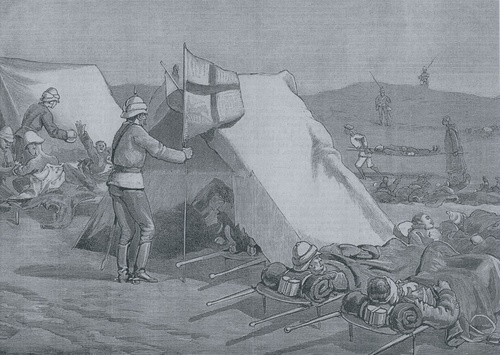
Auction: 19002 - Orders, Decorations and Medals
Lot: 362
'Though many of the wounded had injuries of the severest forms we had no deaths from haemorrhage, a fact which exhibits, in the strongest light the skill and attention of the Medical Officers, working under the most trying circumstances.'
McDowell's verdict on his Medical Staff during the Egyptian campaign.
An important C.B. group of five awarded to Deputy Surgeon-General E. G. McDowell, Principal Medical Officer of Major-General Graham's Eastern Sudan Expeditionary Force at the Battle of El Teb in 1884; after the subsequent relief of Tokar, McDowell was decorated and twice 'mentioned' for the efficiency of his field hospital
The Most Honourable Order of the Bath, C.B. (Military) Companion's breast Badge, gold (18 carat) and enamel, hallmarks for Sebastian Garrard, London 1887, fitted with a narrow gold swivel-ring suspension and replacement silver-gilt riband buckle; China 1860, 1 clasp, Taku Forts 1860 (Asst. Surgn. E. G. McDowell, 44th Regt.); Egypt and Sudan 1882-89, dated reverse, 2 clasps, Suakin 1884, El-Teb_Tamaai (Bde. Surgn. E. G. McDowell. A.M. Dept.); Khedive's Star 1882; Turkey, Ottoman Empire, Order of the Medjidie, 3rd Class neck Badge, silver, gold centre and enamel, local maker's marks to reverse centre and edge, the first with some white enamel chipping and old traces of repair, very fine (5)
C.B. London Gazette 20 May 1884.
Edmund Greswold McDowell was born in November 1831 at Longford, Ireland. He entered the Army Medical Department as an Assistant Surgeon on 6 November 1855, serving in Malta from 8 December that year. He returned to Ireland on 10 November 1856, and was stationed variously at Cottonera, Limerick and Queenstown. On 9 November 1858 he was assigned to the 44th (East Essex) Regiment of Foot, vice Assistant Surgeon John Johnson, who was court-martialled out of the service on 3 October 1858. McDowell served with the 44th during the Second China War, including the action at Sinho and the capture of the Taku Forts on 21 August 1860 (Medal & clasp). Placed in the vanguard of the assault on North Taku, the Regiment earned two Victoria Crosses that day.
McDowell became an Assistant Staff-Surgeon on 12 October 1861, remaining in China until 1863 before returning to Ireland. The years 1866-70 saw him serving in Canada, for which he was promoted to Staff-Surgeon on 3 September 1870. He rose to Surgeon-Major on 1 March 1873, while stationed in Bengal. Promoted to Brigade-Surgeon on 4 August 1881, he served in the Egypt as Medical Superintendent of one of the eight field hospitals attached to Sir Garnet Wolseley's Expeditionary Force, in the midst of a cholera epidemic. For these services he was awarded the 3rd Class of the Order of the Medjidie.
Remaining in Egypt, in 1884 he was appointed Principal Medical Officer of Major-General Graham's Eastern Sudan Expeditionary Force, charged with relieving the Egyptian garrison at Tokar (Medal & 2 clasps). The force landed at Suakin on 20 February, and moved down the Red Sea coast to the Trinkitat lagoon. It was attacked at El Teb on 29 February by a Mahdist army led by the fanatical Osman Digna, who had inspired the Jihadist uprising in Eastern Sudan. Forming into a single square, the British troops repulsed the enemy with the loss of 5 officers and 24 other ranks killed and 17 officers and 142 other ranks wounded. The Mahdists were driven from their entrenched positions around Tokar, and the town's garrison was evacuated. A field hospital was immediately established, and Major-General Graham made a point of visiting the wounded. In his subsequent despatch to Lieutenant-General Stephenson (London Gazette 27 March 1884, refers), Graham reported:
'The Army Medical Department under Deputy Surgeon General McDowell was most ably administered and the wants of the wounded carefully provided for and promptly attended to. As soon as we were in possession of the position at El Teb, on February 29, I signalled to Fort Baker, at the instance of Deputy Surgeon General McDowell, for tents, medical comforts to be sent immediately.
Surgeon General McDowell reported that "though many of the wounded had injuries of the severest forms we had no deaths from haemorrhage, a fact which exhibits, in the strongest light the skill and attention of the medical officers, working under the most trying circumstances."'
After the engagement at Tamaai on 13 March, Graham's column was ordered back to Egypt, leaving General Gordon to fend for himself at Khartoum. McDowell was twice mentioned in dispatches for his medical services (London Gazettes, 27 March and 6 May 1884, refer), and was appointed a Companion of the Bath. Granted the local rank of Deputy Surgeon-General in Egypt on 26 August 1885, he returned to England in 1886. The following year he became President of the Nova Scotian Branch of the British Medical Association.
McDowell retired from the army on 30 November 1891, after 26 years' service. He married Bertha Kathleen Mary Bailey at St. Mary's Church, Cadogan Street, Knightsbridge on 5 February 1901. The Surgeon-General died at Portland on 26 July 1907; sold with copied research.
Subject to 20% VAT on Buyer’s Premium. For more information please view Terms and Conditions for Buyers.
Sold for
£1,800
Starting price
£1400




